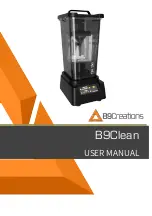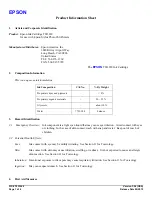
Programmer’s Guide
TH200
92
Formatting of Print Data in the Printable Area
Formatting of print data in the printable area is performed as follows:
1) The printable area is set using
ESC W
. If all printing and feeding are complete before the printer
receives the
ESC W
command, the left side (as you face the printer) is taken as the origin (x0, y0) of the
printable area. The printable rectangular area is defined by the length (dx dots) extending from and
including the origin (x0, y0) in the x direction (perpendicular to the paper feed direction), and by the
length (dy dots) in the y direction (paper feed direction). (If the
ESC W
command is not used, the
printable area remains the default value.)
2) When the printer receives print data after
ESC W
sets the printable area and
ESC T
sets the printing
direction, the print data is formatted within the printable area so that point A in Figure 3.12.2 is at the
beginning of the printable area as a default value. (When a character is printed, point A is the baseline.)
Print data containing downloaded bit images or bar codes is formatted so that the bottom point of the
left side of the image data (point B in Figure 3.12.3) is aligned with the baseline. However, any Human
Readable Interpretation (HRI) characters are printed under the baseline. At the point labeled Point B, if
characters (such as double-height characters) higher than normal size characters or downloaded bit
image characters are received, any part of the character higher than the normal-size character is not
printed.
3) If the print data (including the space to the right of a character) exceeds the printable area before the
printer receives a command (e.g.,
LF
or
ESC J
) that includes line feeding, a line feed is executed
automatically within the printable area. The print position, therefore, moves to the beginning of the next
line. The line feed amount depends on the values set by commands (such as
ESC 2
and
ESC 3
).
4) The default value of the line spacing is set to 4.23 mm {1/6
″} and corresponds to 30 dots in the vertical
direction. If print data for the next line contains extended characters that are higher than double-height
characters, bit images taking up two or more lines, or bar codes higher than normal characters, the
amount of line feeding may be insufficient, resulting in overlapping of the characters' higher-order dots
with the previous line. To avoid this, increase the amount of line spacing. The line spacing in Figure
3.12.4 requires 27 dots or more.
Summary of Contents for TH200
Page 1: ...TH200 High Speed Thermal Printer Programmer s Guide TH200 March 2005 ...
Page 19: ...Programmer s Guide TH200 19 When font B 9 17 is selected ...
Page 21: ...Programmer s Guide TH200 21 When 24 dot bit image is selected ...
Page 73: ...Programmer s Guide TH200 73 pattern 3 2 PAGE1 Katakana ...
Page 74: ...Programmer s Guide TH200 74 3 3 Page 2 PC850 Multilingual ...
Page 75: ...Programmer s Guide TH200 75 3 4 Page 3 PC860 Portuguese ...
Page 76: ...Programmer s Guide TH200 76 3 5 Page 4 PC863 Canadian French ...
Page 77: ...Programmer s Guide TH200 77 3 6 Page 5 PC865 Nordic ...
Page 78: ...Programmer s Guide TH200 78 3 7 Page 18 PC852 Latin2 ...
Page 79: ...Programmer s Guide TH200 79 3 8 Page 19 PC858 ...
Page 80: ...Programmer s Guide TH200 80 3 9 Page 16 WPC1252 ...
Page 81: ...Programmer s Guide TH200 81 3 10 Page 17 PC866 Cyrillic 2 ...
Page 82: ...Programmer s Guide TH200 82 3 11 Thai character code 11 ...
Page 83: ...Programmer s Guide TH200 83 3 12 International Character Set ...















































